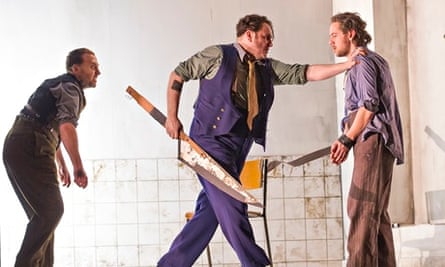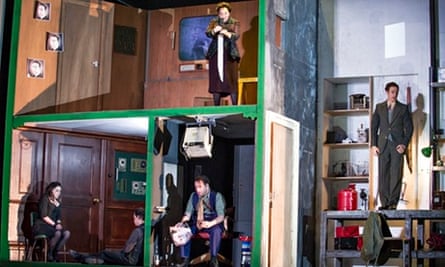
Richard Jones's new production of Rodelinda for English National Opera relocates Handel's masterpiece to an imaginary post-war Italy observed through post-modern eyes. It's an unsettling piece of theatre that probes Handel's bitter political drama with great intelligence, if occasional waywardness.
Written in 1725, the opera examines failures of integrity in the face of power. The usurper, Grimoaldo, has ousted Bertarido, King of Milan, from his country and has designs on his wife, Rodelinda. We soon find ourselves questioning, however, his victims' moral probity. Bertarido puts out a false report of his own death, then returns, disguised, to spy on his "widow's" fidelity. In the work's most alarming scene, Rodelinda dares Grimoaldo to reveal his infamy to the world by killing her son Flavio in front of her. She knows him to be a coward who won't do it. But in gambling the life of her child, she has also briefly equalled him in monstrosity.
Jones's interpretation is bleak. He sets much of it in a series of underground rooms that look like some former fascist bunker, but which now comprise Grimoaldo's office, Rodelinda and Flavio's cell, and a torture chamber for Grimoaldo's nasty sidekick Garibaldo. The only escape from this hellhole is to the dreary bar, where Bertarido (Iestyn Davies) and his sister Eduige (Susan Bickley), drown their sorrows under the watchful eye of Bertarido's loyal servant Unulfo (Christopher Ainslie).

Jones, as so often, tellingly deploys cinematic allusions. Rebecca Evans's agonised Rodelinda looks like Anna Magnani in neorealist mode, while the cameras hidden in her dressing table mirror, which John Mark Ainsley's Grimoaldo uses to perve over her every action, are out of From Russia With Love. It's strong stuff, though Jones departs from Handel in his treatment of the omnipresent yet silent Flavio. In place of a vulnerable child used as a pawn in an adult world, we find an assertive twentysomething played by Matt Casey, complicit in his mother's resistance, and transformed, by the end, into a greater monster than those around him. The point about power breeding violence is forcefully made, but unbalances Handel's moral vision in the process.
Musically it's tremendous, though Ainsley sounded a bit underpowered on opening night. Evans also took a while to settle, but did extraordinary things with her ecstatic aria of relief on discovering that Bertarido is still alive. Bickley is formidable throughout and Christian Curnyn's conducting is well-nigh flawless, as always. Ultimately, however, the evening belongs to its two countertenors, Davies and Ainslie, the former infinitely noble and moving, the latter darker toned yet fabulously agile. They've rarely been bettered in their respective roles, and are both, quite simply, breathtaking.
Save 40% on tickets for selected performances until 11 March. For more, click here.
Comments (…)
Sign in or create your Guardian account to join the discussion